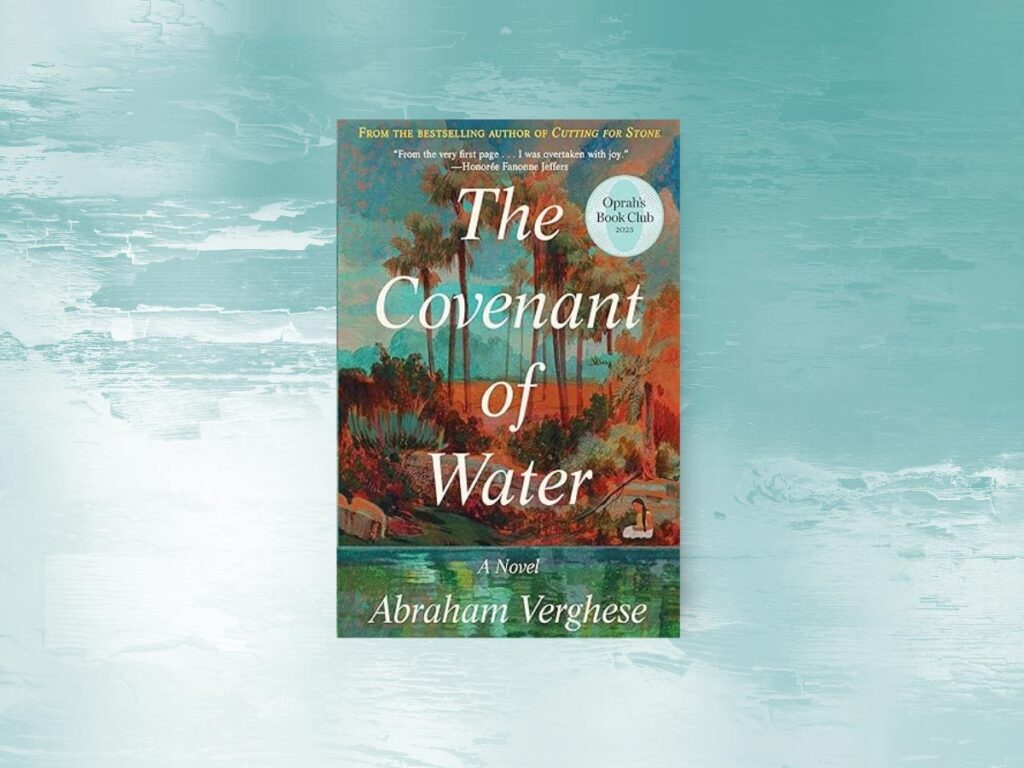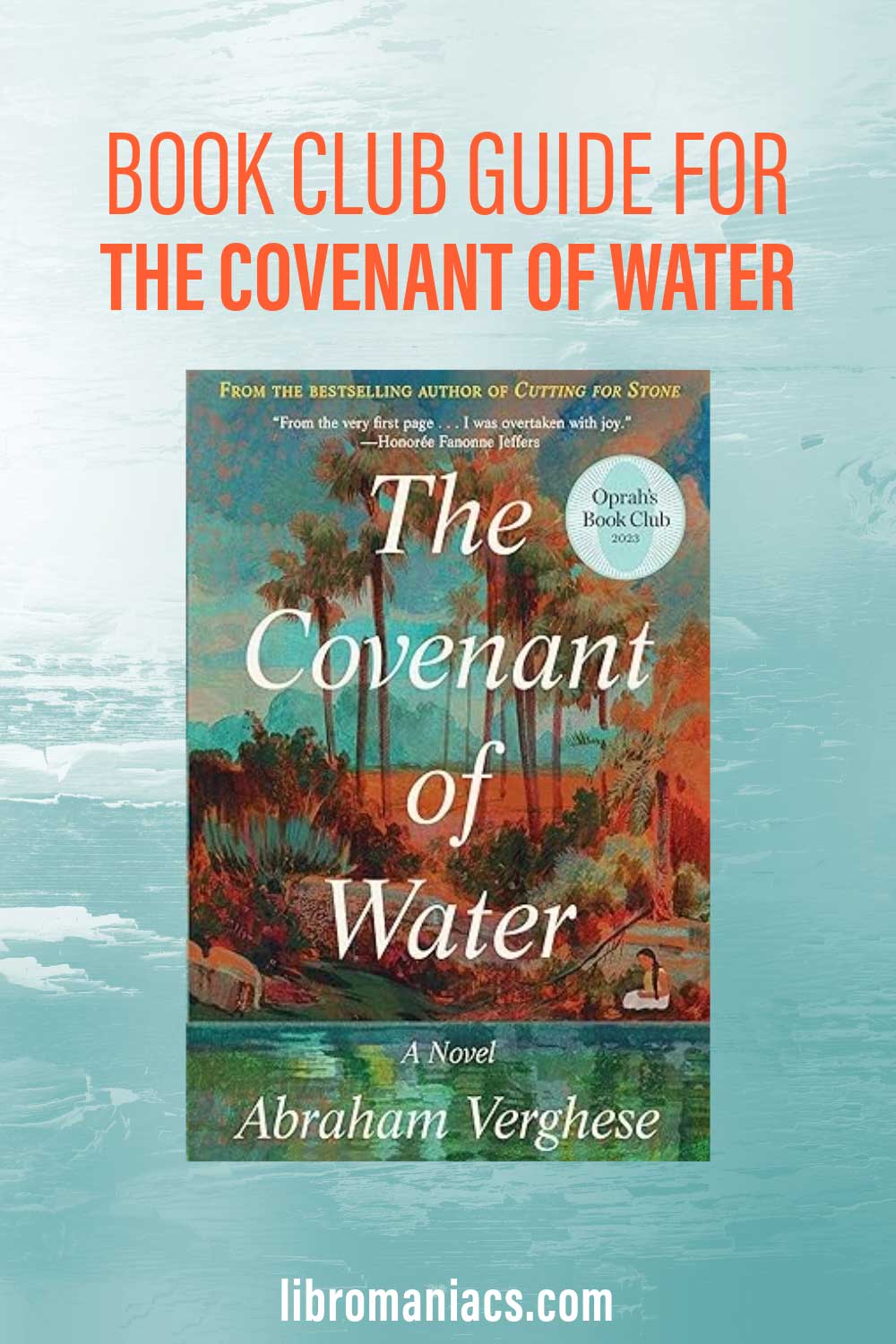An exotic, multi-generational family saga, The Covenant of Water is awash with themes for your book club to discuss. We’re betting you’re a little tired if you made it through all 700 pages of this tome, so we’ve done the hard work for you by preparing this discussion guide to get the conversation started at your book club.
Our list of The Covenant of Water book club questions covers the major elements of the novel: spirituality, the legacy of British colonialism and the Indian caste system, the various forms of love and marriage, and the poignant pain that comes from being mortal. We’ll even ask you to address the elephant in the room. (No, not Damodaran), bur rather, did the novel really need to be so darn long?
In addition to our list of The Covenant of Water book club questions, we’ve provided a plot synopsis and a few diverse perspectives from Goodreads reviews that will help you pinpoint the novel’s strengths and limitations. Last but not least, we have three suggestions for related reads in case you just couldn’t get enough.
So, when you’re ready, let the discussion flow as free as the rivers of Kerala!

(This article contains affiliate links. This means that if you choose to purchase, I’ll make a small commission.)
The Covenant of Water Synopsis
(We always chose to provide the publisher synopsis because we feel that it’s worthwhile to discuss whether the official book description actually squared with your experience of the book.)
The Covenant of Water, Abraham Verghese
The Covenant of Wateris the long-awaited new novel by Abraham Verghese, the author of the major word-of-mouth bestseller Cutting for Stone, which has sold over 1.5 million copies in the United States alone and remained on the New York Times bestseller list for over two years.
Spanning the years 1900 to 1977, The Covenant of Water is set in Kerala, on South India’s Malabar Coast, and follows three generations of a family that suffers a peculiar affliction: in every generation, at least one person dies by drowning—and in Kerala, water is everywhere. At the turn of the century, a twelve-year-old girl from Kerala’s long-existing Christian community, grieving the death of her father, is sent by boat to her wedding, where she will meet her forty-year-old husband for the first time. From this unforgettable new beginning, the young girl—and future matriarch, known as Big Ammachi—will witness unthinkable changes over the span of her extraordinary life, full of joy and triumph as well as hardship and loss, her faith and love the only constants.
A shimmering evocation of a bygone India and of the passage of time itself, The Covenant of Water is a hymn to progress in medicine and to human understanding, and a humbling testament to the difficulties undergone by past generations for the sake of those alive today. It is one of the most masterful literary novels published in recent years.
(This article contains affiliate links. This means that if you choose to purchase, I’ll make a small commission.)
10 The Covenant of Water Book Club Questions
These questions have been tailored to this book’s specific reading experience, but if you want more ideas, we also have an article with 101 generic book club questions.
- Big Ammachi notes that the rivers winding through her home region “spawned a people—Malayalis—as mobile as the liquid medium around them.” How do you think water is represented in Big Ammachi’s personality? How did the environment you grew up in influence your personality?
- Thankamma plays an essential role in helping Big Ammachi adjust to her new home and husband. Were you surprised there was no jealousy between Thankamma and Big Ammachi as they traded places in Big Appachen’s life? How can we learn from others who love the people we love?
- Despite her devotion to Christianity, Big Ammachi firmly believes in ghosts. She even believes ghosts can break pots or cause food to spoil and that she can communicate with them about their behavior. Do you think Christianity and ghosts can coexist? How might these belief systems support or undermine each other?
- Big Ammachi quickly dismisses her guilt for not coming to her mother’s aid in the early years of her marriage: “It’s pointless chastising herself for not rescuing her mother sooner. Happened is happened, she thinks.” Do you agree with Big Ammachi? When is guilt a useful emotion, and when does it become toxic?
- When Digby moves from England to India, he goes from being part of the lower class, (discriminated against for his appearance and accent) to being part of the upper class (respected for his nationality and skin color). Which class do you think Digby enjoys belonging to more? How might you be able to see from the perspective of a different class?
- Despite having a few personal vices, Rune Orqvist is already a beloved and happy physician in his community when he suddenly feels called to abandon his post and start a leper colony. Did you like Rune better before or after he started the leper colony? Did you feel like he lost some personality while gaining in virtue?
- Collectively, the characters in The Covenant of Water witness World War I, World War II, and the Indian Independence Movement. What similarities do you see between these world events? Do they affect the characters differently or in similar ways?
- Numerous characters die prematurely throughout the narrative: Jojo, Digby’s mother, Celeste, Philipose and Elsie’s son, Philipose. Which death struck you as the most tragic and why?
- The plot of The Covenant of Water spans from 1900 – 1977 and includes three generations of Big Ammachi’s family, as well as numerous side characters. Did you enjoy the multi-generational approach to this story? If you could have heard the whole story from just one character’s perspective, whose would you choose?
- Mariamma eventually finds a medical explanation for her family’s “curse.” Did this explanation satisfy you as a reader? Do you think having a medical explanation removes the possibility that the family was cursed?
- And the final, bonus question— was the book too long?
Selected Reviews for The Covenant of Water
“The world-building in this book is breathtaking, with vivid descriptions that paint a vivid picture of the enchanting landscapes and magical realms. The author’s attention to detail is remarkable, immersing listeners in a rich and immersive setting.”
“Covenant of Water is a family saga that spans seven or so decades, so naturally we get to know these characters pretty well. Perhaps a little too well, at times. The number of times I wanted to throttle some characters, only to want to hug them closely later on, gave me such a bad case of emotional vertigo, and I don’t know how I feel about that.”
“It was quite problematic in places: child marriage was romanticized, the legacy of Christianity was largely unexamined, the history lessons were rudimentary, and we had a few characters serving as white savior figures. In conversation with others, I found I wasn’t the only one picking up Gone With the Wind vibes. Verghese has indicated in interviews that he wasn’t interested in engaging these topics on a political level; he was just out to tell a good story. I find that to be a very limiting approach and not at all what I look for in literary fiction. The unfortunate reality is that great works from Kerala and elsewhere in India struggle to find publishers outside the country, even after they are translated. I hope people who enjoyed this, for whatever reason, will be inclined to read work from the region instead of work merely about the region.”
“Did this book need to be over 700 pages? I don’t think so! Readers with a higher tolerance for slow pacing might not mind, but I did find it to drag at times. I breezed through the first 40/50-ish percent before I started to feel that way. I think it started to lose focus a bit, with a lot of tangents that made my interest start to drift. This part can’t really be sugar coated: this is a long, slow-paced, sad book.”
3 Books Like The Covenant of Water
If your book club is looking for more sprawling multi-gen stories, check out our Pachinko discussion guide. And if you liked the Indian setting and marriage themes, try our Honor discussion guide. Or if you like the notion of a multi-gen curse, then try The Unmaking of June Farrow. All of the guides have a synopsis at the top of the page.

The God of Small Things, Arundhati Roy
The Covenant of Water and The God of Small Things share a setting: the lush, water-woven world of Kerala, India. Like Big Ammachi’s family, the twins who narrate The God of Small Things are both spellbound and imprisoned by the world around them. They come into conflict with religious factions, misogyny, and the caste system as they try to navigate life in Kerala. Ultimately, the twins are separated by the mechanics of a prejudiced society, but their bond persists, and they search for a way to be reunited.

Cutting for Stone, Abraham Verghese
If you scroll through very many Goodreads reviews, you’ll find lots of readers wishing that The Covenant of Water had been more like Verghese’s previous novel, Cutting for Stone. Set in Ethiopia at the brink of revolution, Cutting for Stone follows the lives of half-Indian twin brothers, Marion and Shiva, who bond deeply over their passion for medicine. But when the brothers find another shared passion, a woman named Genet, jealousy drives them to opposite ends of the world, and reconciliation seems impossible.

A Thousand Splendid Suns, Khaled Hosseini
If you enjoyed the strong female characters and characters bonding across class divisions in The Covenant of Water, you’ll fall in love with the protagonists of A Thousand Splendid Suns. Mariam is a poor, illiterate woman stuck in a loveless arranged marriage. Laila is a young, well-educated girl full of dreams and opinions. Their lives continue along separate paths until the government of Afghanistan is violently overthrown, and women everywhere become subject to the cruel whims of men. When Mariam’s abusive husband claims Laila as a second wife, Mariam and Laila join forces to fight for a better life for Laila’s daughter.
Have a listen on Audible. Try audio books for free for 30 days.
Share these books club questions for The Covenant of Water with your friends:

